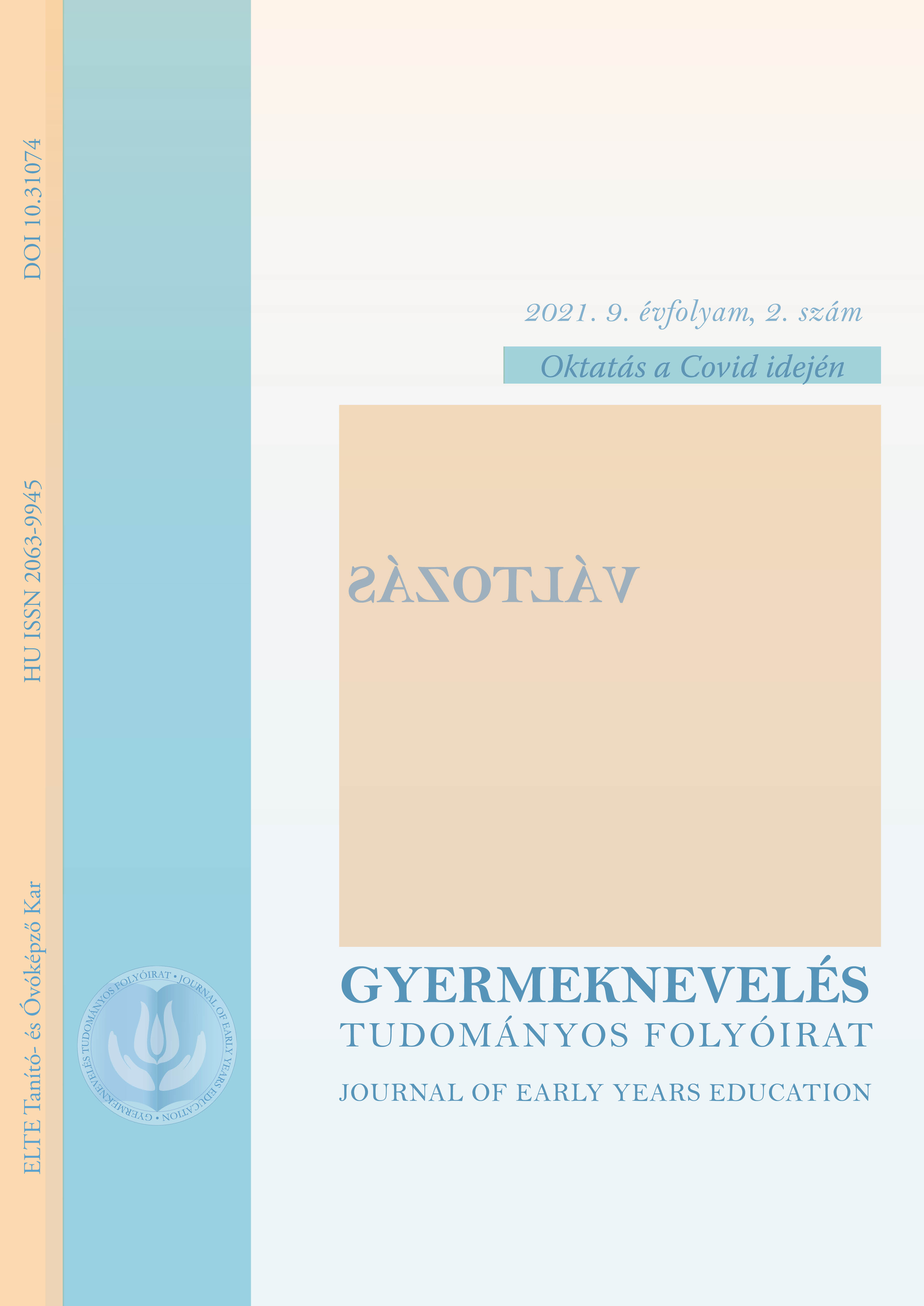Early reading education during Covid19: Perceptions of teachers and parents
DOI:
https://doi.org/10.31074/gyntf.2021.2.131.144Keywords:
Covid19, remote teaching, early reading education, reading skills, reading motivationAbstract
As a consequence of the Covid-19 pandemic, schools in Hungary were closed from March, 2020. The Hungarian government decided to implement digital education: children learning at home were assisted by teachers in the form of remote teaching. We have little information as yet about the effectiveness of digital education during this period. We do not know how the knowledge acquired by students during remote teaching compares to that acquired during face-to-face education. This research therefore aimed to explore the effectiveness of the early teaching and learning of reading. We asked grade 1 and grade 2 elementary school teachers as well as parents about their perceptions of reading education during the period of remote teaching. A voluntary, anonymous online questionnaire was completed by 117 teachers and 83 parents. The findings show that most of the teachers tried to adapt traditional methods of teaching reading to the digital environment during the pandemic, which turned out to be less effective than face-to-face teaching. Both teachers and parents thought that children progressed more slowly with the process of learning to read. For the majority of the students reading motivation was decreased compared to face-to-face learning. The close cooperation of teachers and parents seems essential for effective remote learning in the early years of school. New teaching methods need to be developed and disseminated to increase the effectiveness of early reading education.
Downloads
References
Bánkeszi, K. & Szepesi, J. (2018). Módszertan és eszköztár elektronikus oktatási környezetben. Könyvtári Figyelő, 64(3), 377–390. http://epa.oszk.hu/00100/00143/00353/pdf/EPA00143_konyvtari_figyelo_2018_3_377-390.pdf
Csapó, B. & Csépe, V. (2012, Eds.). Tartalmi keretek az olvasás diagnosztikus értékeléséhez. Nemzeti Tankönyvkiadó.
Csapó, B., Steklács, J. & Molnár, Gy. (2015, Eds.). Az olvasás-szövegértés online diagnosztikus értékelésének tartalmi keretei. Oktatáskutató és Fejlesztő Intézet.
D. Molnár, É., Molnár, E. K. & Józsa, K. (2012). Az olvasásvizsgálatok eredményei. In Csapó, B. (Ed.), Mérlegen a magyar iskola (pp. 17–81). Nemzeti Tankönyvkiadó. https://mek.oszk.hu/12300/12314/12314.pdf
Engler, Á., Markos, V. & Dusa, Á. R. (2021). Szülői segítségnyújtás a jelenléti és távolléti oktatás idején. Educatio, 30(1), 72–87. https://doi.org/10.1556/2063.30.2021.1.6
Farkas, A., Földeáki, A., Főző, A. L., Frész, A J., Genáhl, K. J., Horváth, Á., Jánossy, Zs., Kapcsáné, N. J., Krajcsovicz, Á., Neumann, V., Pintér, G., Sió, L., Szabados, T., Szalay, S. Zs., Szilágyi, Á., Timár B. & Tóth T. (2021). Digitális pedagógiai módszertani ajánlások gyűjteménye. Oktatási Hivatal. https://www.oktatas.hu/pub_bin/dload/kozoktatas/tavoktatas/Modszertani_gyujtemeny_01_08_honlapra.pdf?fbclid=IwAR30VxV9Q2ccD6drMsUb8EXUxHuVWxGmwGUiI3nA_mR01O3EIxMVhB0I-vU
Gliner, J. G., Morgan, G. A. & Leech, N. L. (2017). Research methods in applied settings: An integrated approach to design and analysis. Routledge/Taylor & Francis Group. https://doi.org/10.4324/9781315723082
Jagodics, B., Kóródi, K. & Szabó, É. (2020). Az észlelt tanári énhatékonyságot befolyásoló tényezők vizsgálata a kényszerű digitális oktatás időszakában (2. rész). Iskolakultúra, 30(11), 24–43. https://doi.org/10.14232/ISKKULT.2020.11.24
Jakab, G. (2020). ISKOLA – járvány idején (1. rész). Iskolakultúra, 30(9), 64‒76. https://doi.org/10.14232/ISKKULT.2020.9.64
Józsa, G. & Józsa, K. (2014). A szövegértés, az olvasási motiváció és a stratégiahasználat összefüggése. Magyar Pedagógia, 114(2), 67–89.
Józsa, G., Karáné Miklós, N. & Józsa, K. (2021). A tanulók motiválása a tantermen kívüli, digitális munkarend idején – a pedagógusok tapasztalatai. Gyermeknevelés Tudományos Folyóirat, 9(2), 169–186.
Józsa, K. (2006, Ed.). Az olvasási képesség fejlődése és fejlesztése. Dinasztia Tankönyvkiadó.
Józsa, K. & Steklács, J. (2009). Az olvasástanítás kutatásának aktuális kérdései. Magyar Pedagógia, 109(4), 365–397.
Józsa, K. & Steklács, J. (2012). Az olvasás tanításának tartalmi és tantervi szempontjai. In Csapó, B. & Csépe, V. (Eds.), Tartalmi keretek az olvasás diagnosztikus értékeléséhez (pp. 137–188). Nemzeti Tankönyvkiadó.
Kende, Á., Messing, V. & Fejes, J. B. (2021). Hátrányos helyzetű tanulók digitális oktatása a koronavírus okozta iskolabezárás idején. Iskolakultúra, 31(2), 76–97. https://doi.org/10.14232/ISKKULT.2021.02.76
Molnár, G., Hódi, Á., Ökördi, R. & Mokri, D. (2021). A koronavírus-járvány okozta rendkívüli oktatási helyzet hatása 2–8. évfolyamos diákok tudás- és képességszintjére az olvasásszövegértés, a matematika és a természettudományok területén. Iskolakultúra, 31(2), 3–22. https://doi.org/10.14232/ISKKULT.2021.02.3
N. Kollár, K. (2021). Az online oktatás tapasztalatai és gyakorlata a pedagógusok nézőpontjából. Iskolakultúra, 31(2), 23–53. https://doi.org/10.14232/ISKKULT.2021.02.23
Nagy, J. (2004). Olvasástanítás: a megoldás stratégiai kérdései. Iskolakultúra, 14(3), 3–26. http://epa.oszk.hu/00000/00011/00080/pdf/iskolakultura_EPA00011_2004_03_003-026.pdf
OECD (2016). PISA 2015. Results in focus. OECD Publishing.
OECD (2020). Learning remotely when schools close: How well are students and schools prepared? Insights from PISA. OECD.org
Ostorics, L., Szalay, B., Szepesi, I. & Vadász, Cs. (2016). PISA 2015 összefoglaló jelentés. Oktatási Hivatal.
Porubčanová, D., Geršicová, Z., Bočková, K., Pasternáková, l., Barnová, S., Rochovská, I., Dolinská, E., Dudek, M. & Szőköl, I. (2021). Educational challenges in subject didactics education in the context of home education. STS Science Centre, Ltd. in coedition with KEY Publishing.
Stelitano, L., Doan S., Woo, A., Diliberti, M., Kaufman, J. H. & Henry, D. (2020). The digital divide and Covid-19: Teachers’ perceptions of inequities in students’ Internet access and participation in remote learning. RAND Corporation, https://doi.org/10.7249/RRA134-3 https://doi.org/10.7249/RRA134-3
Szenczi, B. (2013). Olvasási motiváció 4., 6. és 8. osztályos tanulók körében. Magyar Pedagógia, 113(4), 197–220.
Downloads
Published
How to Cite
Issue
Section
License
Copyright (c) 2021 Author

This work is licensed under a Creative Commons Attribution-NonCommercial-ShareAlike 4.0 International License.

